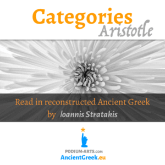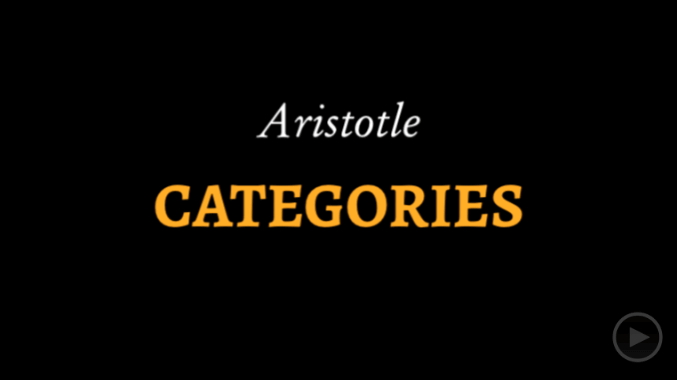• Categories •
• Aristotle •

Duration: 1 hour 40 mins
Unabridged
Recorded: 2023
Price : $50
About “Categories" by Aristotle
In this work Aristotle identifies ten basic types of things or categories which play a fundamental role in helping us understand and organise the world around us. These are substance, quantity, quality, relation, place, time, position, state, action, and affection. The most important of them is the category of substance.
He defines substance as that which something is, and not just what it appears to be. He also argues that substances have properties and accidents, properties are those that are essential to the substance, while accidents are those that are not.
Aristotelian Categories also include quantity, which refers to the amount or size of something, and quality, which refers to the characteristics or properties of something. Relation refers to the way in which things are related to one another, while place and time refer to the location and duration of something. Position and state refer to the way in which something is situated or arranged, and action and affection refer to the activity or effects of something.
Aristotle's "Categories" is a complex work that raises many questions and offers various interpretations. But generally it is considered a foundation of Aristotelian logic, metaphysics and ontology. It provides a framework for understanding and categorizing the world around us, and it continues to influence philosophy, logic, and other fields today.
You can follow the Greek text of “Categories”, by Aristotle, online at archive.org. A translation in English is found here.
About Aristotle
Aristotle (Gr.: Ἀριστοτέλης), one of the most important philosophers of Antiquity, was born in 385 BCE in Stageira of Chalkidike. Born in a rich family he had the opportunity to get high education. From 367 BCE on and for about twenty years, he studied philosophy in Athens by Plato and also taught in his Academy. After the death of Plato he moved to the city of Assus in Asia Minor, where he taught philosophy until 345 BCE., when he accepted an invitation by Theophrastus to teach in Mytilene. In 342 BCE King Philippus asked him to teach his 13 years old son, Alexander. After the death of Philippus Aristotle returned to Athens and established the “Lyceum”, where he set his teaching forth. However, after the death of Alexander in 323 BCE and having been accused by opponents for disrespect, he retired in Chalkis. He died in 322 BC from some stomach disease.
Aristotle left a lot of works. The works that have survived are distinguished in logical, physical, biological, psychological, metaphysical, moral, political, technological and various problems.
The Aristotelian works have included the following, which are not considered genuine: Physiognomy, About Miraculous Things Heard, About Colors, Mechanics, Rhetoric to Alexander and On Hearing.
About the audiobook
 The recording contains the complete, unabridged Ancient Greek text of “Categories" by Aristotle. After purchase you will be able to download the relevant mp3 file.
The recording contains the complete, unabridged Ancient Greek text of “Categories" by Aristotle. After purchase you will be able to download the relevant mp3 file.
You can listen to chapter 1 of “Categories”, an audio sample of the present audiobook. Please, click on the play-button bellow and, if you wish, follow the Ancient Greek text lower on the page, or alternatively watch the video, which is provided with a quick translation in English. Thank you!
ΚΑΤΗΓΟΡΙΑΙ
Ὁμώνυμα λέγεται ὧν ὄνομα μόνον κοινόν, ὁ δὲ κατὰ τοὔνομα λόγος τῆς οὐσίας ἕτερος, οἷον ζῷον ὅ τε ἄνθρωπος καὶ τὸ γεγραμμένον. τούτων γὰρ ὄνομα μόνον κοινόν, ὁ δὲ κατὰ τοὔνομα λόγος τῆς οὐσίας ἕτερος· ἂν γάρ τις ἀποδιδῷ τί ἐστιν αὐτῶν ἑκατέρῳ τὸ ζῴῳ εἶναι, ἴδιον ἑκατέρου λόγον ἀποδώσει.
Συνώνυμα δὲ λέγεται ὧν τό τε ὄνομα κοινὸν καὶ ὁ κατὰ τοὔνομα λόγος τῆς οὐσίας ὁ αὐτός, οἷον ζῷον ὅ τε ἄνθρωπος καὶ ὁ βοῦς. ὁ γὰρ ἄνθρωπος καὶ ὁ βοῦς κοινῷ ὀνόματι προσαγορεύεται ζῷον, καὶ ὁ λόγος δὲ τῆς οὐσίας ὁ αὐτός· ἐὰν γὰρ ἀποδιδῷ τις τὸν ἑκατέρου λόγον, τί ἐστιν αὐτῶν ἑκατέρῳ τὸ ζῴῳ εἶναι, τὸν αὐτὸν λόγον ἀποδώσει.
Παρώνυμα δὲ λέγεται ὅσα ἀπό τινος διαφέροντα τῇ πτώσει τὴν κατὰ τοὔνομα προσηγορίαν ἔχει, οἷον ἀπὸ τῆς γραμματικῆς ὁ γραμματικὸς καὶ ἀπὸ τῆς ἀνδρείας ὁ ἀνδρεῖος.
